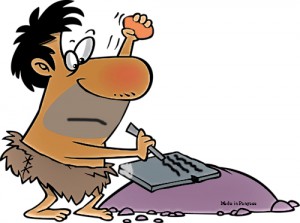For anyone who has ever played the telephone game, you know that the message passed from one person to another changes greatly over a short distance. This happened in our office recently when someone in the factory was paged.
A team member who had not heard the message asked,
“Who was just paged?”
“Mike,” came the reply.
Then another person asked, “what did he ask?”
“Oh, he just wanted to know who paged Mike.”
If you look closely you’ll see that the exact opposite of the original message was conveyed. Someone wanted to know who was paged, but was then represented to have asked was who paged Mike.
We Only Remember 20% of What we Hear
A great pamphlet on communicating is a booklet called Skill With People, by Les Giblin. One of the messages from Mr. Giblin is that people tend to only recall about 20% of what they hear and 70% of what they say.
This is why team building exercises involve a good deal of demonstration and participation. It is also why when we are working on something it is important to keep a file of the work we are doing. This can be done through one’s Outlook account or with the use of a file pocket or binder that is properly indexed.
Aside from being able to keep track of everything, it’s important to keep everything filed for other reasons, as well.
Why Good Organization Matters
When a vendor promises you something, having an email of the details will help keep everyone honest. For example, if they are going to be late and try to convince you that they promised something in 4 weeks instead of 2, you can forward them the original message.
If a customer inquires as to when her shipment will arrive, having a file of orders should include logistical tracking numbers, which will allow you to check with the carrier about the status of the delivery. Not having this readily available could lead to guess-work or false promises.
Lastly, good organization of documents is the result of a more efficient workplace. When everything has a place, and gets put in that place, less goes unnoticed. For example, past due accounts are followed up with more aggressively, accountability increases, and production runs more smoothly.
How to Increase Written Documentation
Now that we know why this matters, it’s important to know how to do this.
Scanning documents, such as invoices and receipts, is a great way to keep your office paperless, but how do you get written documentation of something that is said over the phone? Simple: following a conversation,
request that the details of the matter be sent to you over an email or fax. In addition to this, take any notes you feel are pertinent to the matter.
By keeping a written history of the work you do, you can avoid passing along incorrect information to others, and you can keep your business running more efficiently.

